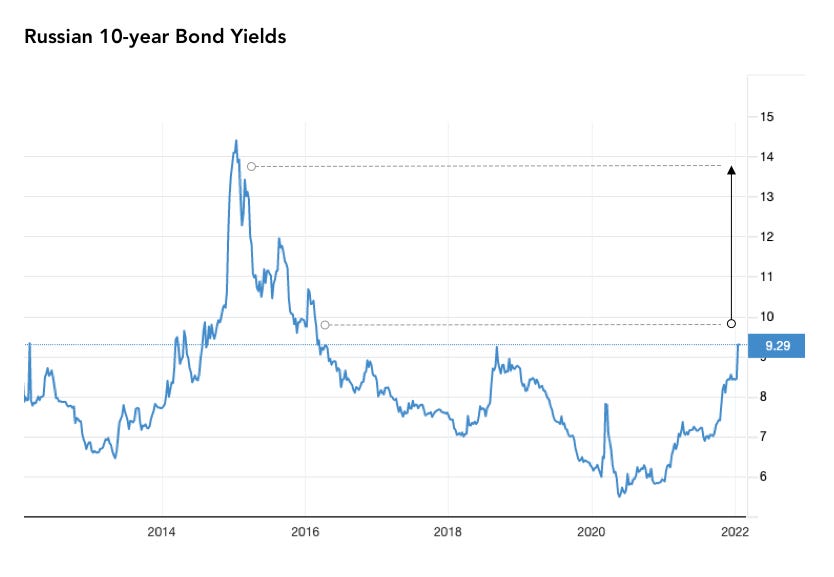What’s going on with Russia and Ukraine?
Long story short, Russia doesn’t want Ukraine to join NATO.
Ukraine is currently not part of NATO, but it has been steadily leaning towards joining European institutions for a while now. Ukraine’s president tweeted in December that western leaders had confirmed his country will become a member of “the Alliance,” which many western leaders then later rebuked.
And on the face of things, this is pissing off Russian leadership, to the point they are staking their political future on forcing the U.S. back to the negotiating table.
Will Ukraine really join NATO?
Ukraine still ranks low on corruption indicators, its legal system still needs work, and its defense sector is not fully modernized. So Ukraine won’t be joining anytime soon, and western officials have stated as such.
That said, NATO has provided weapons and training to Ukraine in the recent past. And Ukraine’s leadership has been very determined in joining, even if NATO officials themselves are not keen.
In response, Putin is demanding Ukraine never join NATO. Ever. Putin is also calling for all NATO arms out of Eastern Europe. He is also calling for a ban on NATO missiles within striking distance of Russia, as well as autonomy for eastern Ukraine where pro-Russian separatists live. There is also a pipeline Russia is trying to build to export natural gas to Europe, which has its own drama behind it.
Big picture, experts seem to think this is Putin’s last stand against NATO’s expansion eastward. Putin never liked the agreements Russia made in the past with the U.S. and its allies. The window for him to rectify these wrongs is fast closing, at least in his eyes.
Will Russia invade?
Most experts think Russia engaging in a full-scale troop invasion is unlikely, but the risks are still there. Many think Putin is backing himself into a political corner by drawing lines in the sand that will make him look weak if he acquiesces.
Still, the die is not cast. He may decide to invade only through half the country, effectively creating a much-wanted buffer zone between Ukraine and Russia. A less direct yet perhaps more insidious approach would be for Russia to elevate its “gray” warfare tactics, such as engaging in cyber operations to cripple critical infrastructure in both Ukraine and the U.S. This could do considerable harm given current snarls in U.S. logistics.
The U.S. has listed several repercussions if Russia invades but has been adamant it will not send troops to Ukraine to fight. Instead, it will give more defense aid to Ukraine in the form of drones, while Britain has said it will supply anti-tank weapons. NATO likewise has said it will reposition military deployments. Financial sanctions will be strengthened as well, such as targeting financial institutions and limiting foreign institutions from owning Russia’s sovereign debt. Cyber countermeasures won’t be off the table.
The problem is, the EU is not fully onboard. Europe imports 45 percent of its gas from Russia, and the EU is worried they may cut off natural gas supplies as punishment. So America’s punishment efforts may not have much teeth as it would like.
How will markets react?
Possibly through several mechanisms:
The Russian ruble may depreciate beyond the 80 rubles / USD level. The last time Russia engaged in military action in this area in 2016, the ruble blew past the 80 level, and we’re likely to see depreciation pressures if they move again. This reflects both the geopolitical risks associated with the ruble as well as the financial sanctions likely to be put on Russian bond issuers - mainly the sovereign - by the U.S. and its other allies. However, Russia has sizable foreign exchange reserves, so even if there are some short-term moves, they may not last for long.
Russian bond yields will increase. Current U.S. sanctions ban the purchase of new issues of Russian debt by U.S. banks. But they do not affect secondary trading. This may change if Russia decides to invade, as Congress may bar U.S. banks from owning Russian sovereign debt entirely. This would likely cause Russian debt yields to increase, as they did in 2014.
Cyber-attacks may increase. Russia has been changing its tactics when it comes to cyber-warfare. They are increasingly targeting the “tech” supply chain, companies that supply backend services to companies around the U.S. (e.g. the SolarWind attack in 2019-2020). These attacks can cause serious disruption to the stock price of a company, as the SolarWinds attack shows below. Past attacks have also occurred against Colonial Pipeline and meat supplier JBS SA. We should expect future attacks against major infrastructure providers - technological, physical infrastructure, database providers, healthcare providers, even entertainment providers that could provide significant “shock” value to the U.S. public - in the near future should America decide to retaliate.
Disclaimer: BubbleCatcher is published as an information service for subscribers, and it includes opinions as to forecasts on the global economy and its impact on securities linked to economic activity. The publishers of BubbleCatcher are not brokers or investment advisers, and they do not provide investment advice or recommendations directed to any particular subscriber or in view of the particular circumstances of any particular person. BubbleCatcher does NOT receive compensation from any of the companies featured in our articles. At various times, the publisher of BubbleCatcher may own, buy or sell the securities discussed for purposes of investment or trading. BubbleCatcher and its publishers, owners, and agents are not liable for any losses or damages, monetary or otherwise, that result from the content of BubbleCatcher. Past results are not necessarily indicative of future performance. The information contained on BubbleCatcher is provided for general informational purposes as a convenience to the subscribers of BubbleCatcher. The materials are not a substitute for obtaining professional advice from a qualified person, firm, or corporation. Consult the appropriate professional advisor for more complete and current information. BubbleCatcher makes no representations or warranties about the accuracy or completeness of the information contained on this website. Any links provided to other server sites are offered as a matter of convenience and in no way are meant to imply that BubbleCatcher endorses, sponsors, promotes, or is affiliated with the owners of or participants in those sites, or endorses any information contained on those sites unless expressly stated.
.







